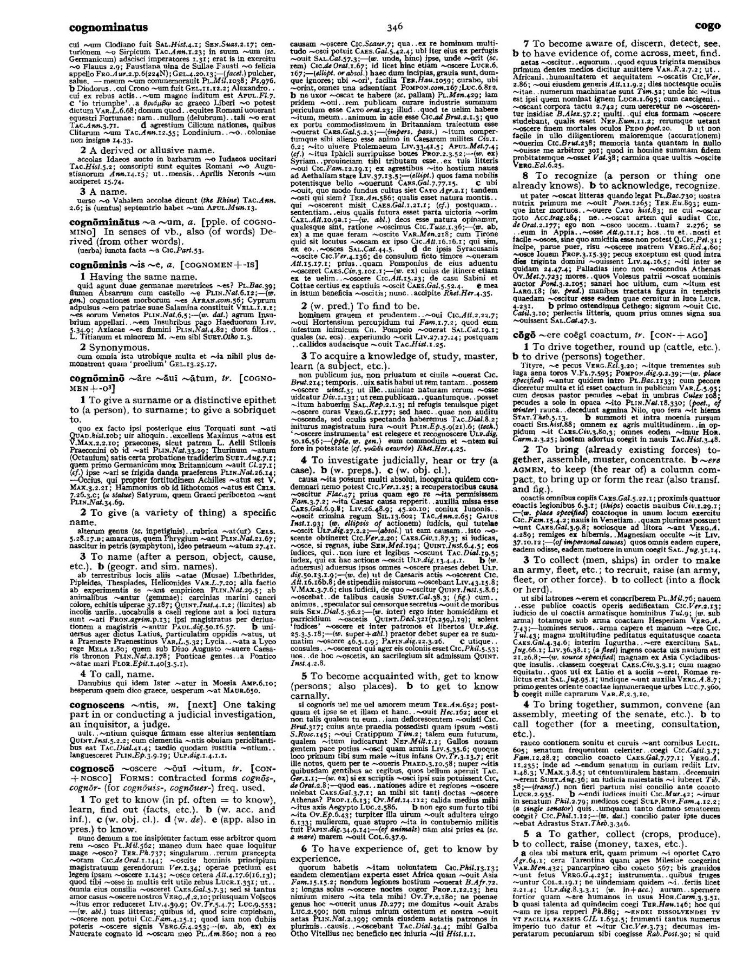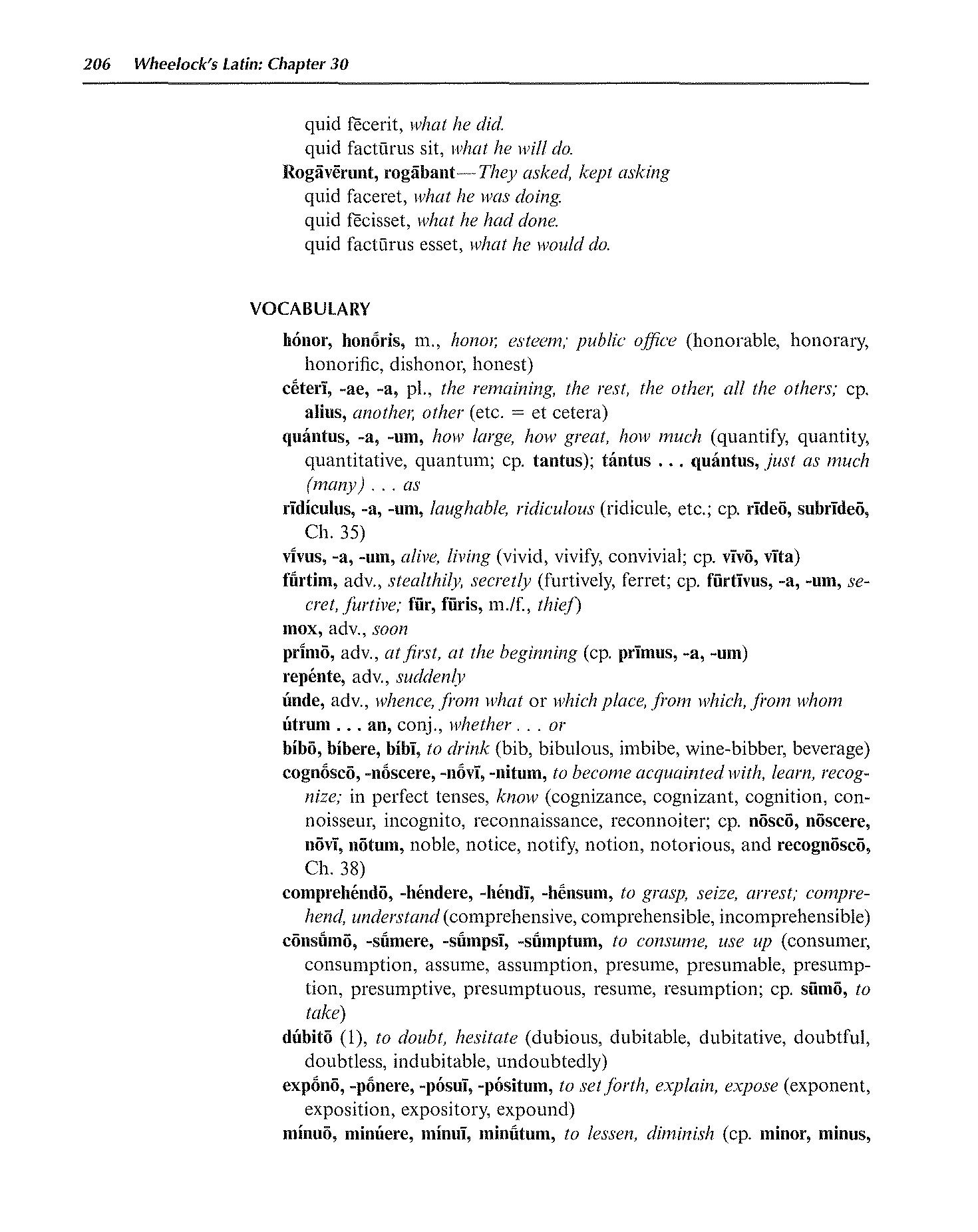
page_listing.tpl
page_subListingDetails.tpl
sub_listingDetails_style1.tpl
sub_listingDetails.title.tpl
cōgnōscere to recognize
cōgnōscere is a Latin Verb that primarily means to recognize.
Definitions for cōgnōscere
Wheelock's Latin
Verb
- 1
to become acquainted with, learn, recognize
- 2
in perfect tenses, know
English derivatives:
cognizance cognizant cognition connoisseur incognito reconnaissance reconnoiter
Oxford Latin Dictionary
Verb
- 1
To get to know (in pf. often = to know), learn, find out (facts, etc.). (b) (w. acc. and inf.). (c) (w. obj. cl.) (d) (w. de.) (e) (app. also in pres.) to know.
- 2
(w. pred.) To find to be.
- 3
To acquire a knowledge of, study, master, learn (a subject, etc.).
- 4
To investigate judicially, hear or try (a case). (b) (w. preps.). (c) (w. obj. cl.).
- 5
To become acquainted with, get to know (persons; also places). (b) to get to know carnally.
Sentences with cōgnōscere
Latin to English
Ōrātor rogāvit cūr cēterī cīvēs haec cōnsilia nōn cognōvissent.Compare The orator asked why the other citizens had not learned these plans.
Cum dōna iūcunda tulissent, potuī tamen īnsidiās eōrum cognōscere.Compare Although they had brought pleasing gifts, I was able nevertheless to recognize their treachery.
Quaerisne ut nātūram omnium rērum cognōscāmus?Compare Do you ask that we learn (= ask us to learn) the nature of all things?
Cognōvimus pācem in patriā eōrum nōn inventam esse.Compare We learned that peace had not been found in their country.
Cum eum vidēbis, eum cognōscēs.Compare When you (will) see him [i.e., at that very moment], you will recognize him.
Cum cognōvisset quanta beneficia cēterī trēs offerent, ipse aequa beneficia obtulit.Compare When he had learned what great benefits the other three men were offering, he himself offered equal benefits.
Introduco Statilius: cognosco signum; recito tabella.Compare Statilius was brought in: he recognised the seal: the papers were read.
Quis ago, et ubi sum, cognosco.Compare I knew what you were doing, and where you were.
Conjugation table for cōgnōscere
Cactus2000
| ACTIVE | |
| Indicative present | Indicative imperfect |
| cōgnōscō cōgnōscis cōgnōscit cōgnōscimus cōgnōscitis cōgnōscunt | cōgnōscēbam cōgnōscēbās cōgnōscēbat cōgnōscēbāmus cōgnōscēbātis cōgnōscēbant |
| Indicative perfect | Indicative pluperfect |
| cōgnōvī cōgnōvistī cōgnōvit cōgnōvimus cōgnōvistis cōgnōvērunt / cōgnōvēre | cōgnōveram cōgnōverās cōgnōverat cōgnōverāmus cōgnōverātis cōgnōverant |
| Indicative future | Indicative future perfect |
| cōgnōscam cōgnōscēs cōgnōscet cōgnōscēmus cōgnōscētis cōgnōscent | cōgnōverō cōgnōveris cōgnōverit cōgnōverimus cōgnōveritis cōgnōverint |
| Subjunctive present | Subjunctive imperfect |
| cōgnōscam cōgnōscās cōgnōscat cōgnōscāmus cōgnōscātis cōgnōscant | cōgnōscerem cōgnōscerēs cōgnōsceret cōgnōscerēmus cōgnōscerētis cōgnōscerent |
| Subjunctive perfect | Subjunctive pluperfect |
| cōgnōverim cōgnōveris cōgnōverit cōgnōverimus cōgnōveritis cōgnōverint | cōgnōvissem cōgnōvissēs cōgnōvisset cōgnōvissēmus cōgnōvissētis cōgnōvissent |
Infinitive present cōgnōscere Infinitive perfect cōgnōvisse Infinitive future cōgnitūrum esse | Imperative present cōgnōsce cōgnōscite Imperative future cōgnōscitō cōgnōscitō cōgnōscitōte cōgnōscuntō |
| PASSIVE | |
| Indicative present | Indicative imperfect |
| cōgnōscor cōgnōsceris cōgnōscitur cōgnōscimur cōgnōsciminī cōgnōscuntur | cōgnōscēbar cōgnōscēbāris / cōgnōscēbāre cōgnōscēbātur cōgnōscēbāmur cōgnōscēbāminī cōgnōscēbantur |
| Indicative perfect | Indicative pluperfect |
| cōgnitus sum cōgnitus es cōgnitus est cōgnitī sumus cōgnitī estis cōgnitī sunt | cōgnitus eram cōgnitus erās cōgnitus erat cōgnitī erāmus cōgnitī erātis cōgnitī erant |
| Indicative future | Indicative future perfect |
| cōgnōscar cōgnōscēris / cōgnōscēre cōgnōscētur cōgnōscēmur cōgnōscēminī cōgnōscentur | cōgnitus erō cōgnitus eris cōgnitus erit cōgnitī erimus cōgnitī eritis cōgnitī erunt |
| Subjunctive present | Subjunctive imperfect |
| cōgnōscar cōgnōscāris / cōgnōscāre cōgnōscātur cōgnōscāmur cōgnōscāminī cōgnōscantur | cōgnōscerer cōgnōscerēris / cōgnōscerēre cōgnōscerētur cōgnōscerēmur cōgnōscerēminī cōgnōscerentur |
| Subjunctive perfect | Subjunctive pluperfect |
| cōgnitus sim cōgnitus sīs cōgnitus sit cōgnitī sīmus cōgnitī sītis cōgnitī sint | cōgnitus essem cōgnitus essēs cōgnitus esset cōgnitī essēmus cōgnitī essētis cōgnitī essent |
Infinitive present cōgnōscī Infinitive perfect cōgnitum esse Infinitive future cōgnitum īrī | Imperative present cōgnōscere cōgnōsciminī Imperative future cōgnōscitor cōgnōscitor - cōgnōscuntor |
| PARTICIPLE | ||
| Participle present active | ||
| Nom. | cōgnōscēns | cōgnōscentēs |
| Gen. | cōgnōscentis | cōgnōscentium |
| Dat. | cōgnōscentī | cōgnōscentibus |
| Acc. | cōgnōscentem | cōgnōscentēs |
| Abl. | cōgnōscente | cōgnōscentibus |
| Participle future active | ||
| Nom. | cōgnitūrus | cōgnitūrī |
| Gen. | cōgnitūrī | cōgnitūrōrum |
| Dat. | cōgnitūrō | cōgnitūrīs |
| Acc. | cōgnitūrum | cōgnitūrōs |
| Abl. | cōgnitūrō | cōgnitūrīs |
| Participle perfect passive | ||
| Nom. | cōgnitus | cōgnitī |
| Gen. | cōgnitī | cōgnitōrum |
| Dat. | cōgnitō | cōgnitīs |
| Acc. | cōgnitum | cōgnitōs |
| Abl. | cōgnitō | cōgnitīs |
| Gerundive | ||
| Nom. | cōgnōscendus | cōgnōscendī |
| Gen. | cōgnōscendī | cōgnōscendōrum |
| Dat. | cōgnōscendō | cōgnōscendīs |
| Acc. | cōgnōscendum | cōgnōscendōs |
| Abl. | cōgnōscendō | cōgnōscendīs |
| Gerund | Supine | |
| Nom. | cōgnōscere | cōgnitum |
| Gen. | cōgnōscendī | cōgnitū |
| Dat. | cōgnōscendō | |
| Acc. | cōgnōscendum | |
| Abl. | cōgnōscendō | |
Data sources
Notes
- Definitions
- Frederick M. Wheelock, Wheelock's Latin, 6th ed., rev. Richard A. LaFleur (New York, NY: HarperCollins Publishers, 2005): 206.
- P. G. W. Glare, Oxford Latin Dictionary, Vols. 1-8 (Oxford: Clarendon Press, 1982): 346.
- Word frequencies
- Christopher Francese, "Latin Core Vocabulary," Dickinson College Commentaries, last modified 2014, http://dcc.dickinson.edu.
- Paul B. Diederich, The Frequency of Latin Words and Their Endings, PhD diss., (Columbia University, 1939).
- Louis Delatte, Suzanne Govaerts, Joseph Denooz, and Etienne Evrard, Dictionnaire fréquentiel et index inverse de la langue latine [Frequency Dictionary and Inverse Index of the Latin Language] (Liège, Belgium: Laboratoire d'analyse statistique des langues anciennes de l'Université de Liège [L.A.S.L.A.], 1981): 121.
Bibliography
Allen, Joseph H. Allen and Greenough's New Latin Grammar for Schools and Colleges: Founded on Comparative Grammar. Edited by James B. Greenough, George L. Kittredge, Albert A. Howard, and Benjamin L. D'Ooge. Boston, MA: Ginn & Company, 1903.
Crystal, David. A Dictionary of Linguistics and Phonetics. 6th ed. Oxford, UK: Blackwell Publishing, 2008.
Delatte, Louis, Suzanne Govaerts, Joseph Denooz, and Etienne Evrard. Dictionnaire fréquentiel et index inverse de la langue latine [Frequency Dictionary and Inverse Index of the Latin Language]. Liège, Belgium: Laboratoire d'analyse statistique des langues anciennes de l'Université de Liège (L.A.S.L.A.), 1981.
Diederich, Paul B. The Frequency of Latin Words and Their Endings. PhD diss., Columbia University, 1939.
Francese, Christopher. "Latin Core Vocabulary." Dickinson College Commentaries. Last modified 2014. http://dcc.dickinson.edu/latin-vocabulary-list.
Gildersleeve, Basil L., and Gonzales Lodge. Gildersleeve's Latin Grammar: Third Edition, Revised, and Enlarged. 3rd ed. London, England: Macmillan and Co., 1903.
Glare, Peter G.W. Oxford Latin Dictionary. Vols. 1-8. Oxford, England: Clarendon Press, 1982.
Krüger, Bernd. "Latin Conjugation Tables." Cactus2000. Accessed May 5, 2023. https://latin.cactus2000.de/index.en.php.
Pierson, Nick. "Sound of Text." Accessed October 26, 2019. https://soundoftext.com.
Wheelock, Frederick M. Wheelock's Latin. 6th ed. Revised by Richard A. LaFleur. New York, NY: HarperCollins Publishers, 2005.
Wiktionary Contributors. "Victionarium." Wikimedia Foundation, Inc. Updated March 18, 2019. https://la.wiktionary.org/wiki/Victionarium:Pagina_prima.
Citation
Chicago (17th ed.)
Allo Contributors. "cōgnōscō, cōgnōscere, cōgnōvī, cōgnitum (v.) - Latin Word Definition." Allo Latin Dictionary. Last modified . Accessed February 1, 2026. http://ancientlanguages.org/latin/dictionary/cognosco-cognoscere-cognovi-cognitum.
Entry created on . Last updated on .







